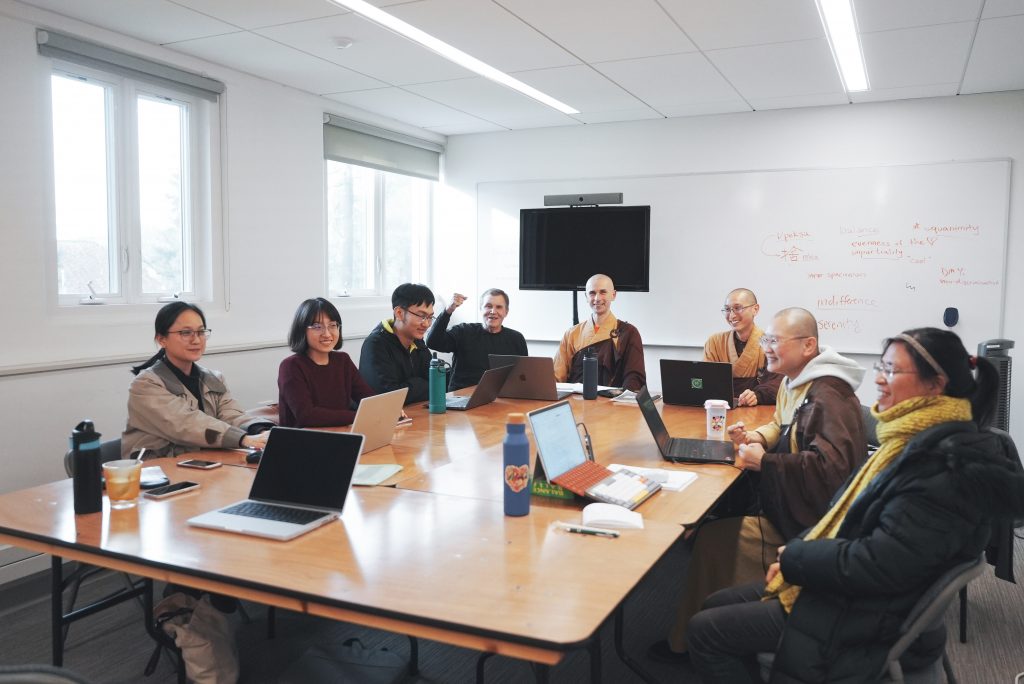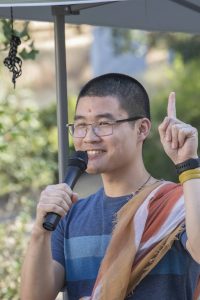Classes
Graduate Certificate in Buddhist Translation
The Graduate Program in Translation provides a 1-year integrated program of coursework.
The following course descriptions outline basic course requirements only. More detailed information regarding elective coursework and other course requirements will be available during individual consultations. The requirements need to be completed within two consecutive semesters. The program’s objective is to give students a framework from which they develop skills in translation and deepen their understanding of Buddhist concepts.
Courses
Translating the Dharma: Theories, Ethics, and Skills (TRNC 11 / TRNC 12)
 This course introduces basic translation theories and ethics, as well as research skills and resources, terminology management, and teamwork skills integrating the BTTS Four Committee process. This course will also introduce students to selected contemporary scholarship in translation studies. Students will be invited to consider how the Dharma might be translated into different disciplines. They will be encouraged to move away from meaning-based linguistic equivalence to produce translations that reach out to the modern mind and serve as catalysts for transformation. In the lab component, students will receive guidance and work closely with their advisors on individual translation projects, applying principles and skills of interpretation and translation learned in this course and/or in the Hermeneutics courses of the DRBU MA program. An individual translation project is required to complete this program. (read syllabus)
This course introduces basic translation theories and ethics, as well as research skills and resources, terminology management, and teamwork skills integrating the BTTS Four Committee process. This course will also introduce students to selected contemporary scholarship in translation studies. Students will be invited to consider how the Dharma might be translated into different disciplines. They will be encouraged to move away from meaning-based linguistic equivalence to produce translations that reach out to the modern mind and serve as catalysts for transformation. In the lab component, students will receive guidance and work closely with their advisors on individual translation projects, applying principles and skills of interpretation and translation learned in this course and/or in the Hermeneutics courses of the DRBU MA program. An individual translation project is required to complete this program. (read syllabus)
Reading Seminar (TRNC 21 / TRNC 22)
This course is designed to enhance students’ translation skills through the appreciation of poetic forms, literary devices, and cultural context in great works selected from various genres, traditions, and ages (see sample reading list below). Through shared inquiry, students will explore primary texts both in their source language as well as in multiple translations, comparing different ways of interpreting and conveying meaning. Some literary selections will be presented by guest lecturers. At the end of the semester students will present their individual translation projects, in which they analyze how particular translation choices impact what is conveyed to the reader. (read syllabus)
Hermeneutics of Self (TRNC 31)
 This course is designed to introduce students to the more subjective dimension of Buddhist translation—how understanding and interpreting is determined by the presuppositions and beliefs of the interpreter. Hermeneutics of Self is concerned with determining the psychological, emotional, and mental conditions that make both understanding and misunderstanding possible. Through the study of biographies and autobiographical records of eminent Buddhist translator-practitioners, such as personal diaries, journals, poetry, and lived encounters, we explore how in their effort to produce accurate translations of texts, they also struggled to uncover and transform the unexamined biases and predispositions that might cloud their work.
This course is designed to introduce students to the more subjective dimension of Buddhist translation—how understanding and interpreting is determined by the presuppositions and beliefs of the interpreter. Hermeneutics of Self is concerned with determining the psychological, emotional, and mental conditions that make both understanding and misunderstanding possible. Through the study of biographies and autobiographical records of eminent Buddhist translator-practitioners, such as personal diaries, journals, poetry, and lived encounters, we explore how in their effort to produce accurate translations of texts, they also struggled to uncover and transform the unexamined biases and predispositions that might cloud their work.
As a corollary to translation work and close reading of primary texts, students will engage in contemplative practice and self-cultivation exercises embedded and advocated in the texts they are translating, and mindful service emulating the translators whose lives they are studying. This hermeneutical approach, where intellectual inquiry is enhanced through meditative exercises, aims to give students a holistic appreciation of what it means to be a translator-practitioner as understood and derived from Buddhist sources. The insights acquired through these readings along with direct laboratory experience provide a study-practice hermeneutical dimension that students may reference in their translation work in the program. (read syllabus)
Translation Workshop (TRNC 41 / TRNC 42)
Inspired by the Buddhist translation assemblies held in imperial China, the Translation Workshop is a laboratory for live translation practice in a group setting. Under the supervision of instructors, students work in teams with more experienced translators in a process of primary translation, bilingual review, and editing of selected canonical texts. During the workshop, students will practice doing research and building terminology lists, including alternative translations, which the entire class will standardize to ensure consistency of translation. Students will be evaluated both on their individual translation capacity as well as on their development of interpersonal skills and team spirit. (read syllabus)

Canonical Languages (TRNC 51)
Buddhist Chinese
This course is designed to introduce the basic features of Buddhist Chinese and to solidify students’ foundation in Classical Chinese. We begin with a series of lessons that introduce the principal rules behind Chinese characters, basic grammar, and common structures in Chinese Buddhist scriptures. Buddhist technical terms and Chinese Buddhist idioms will be investigated to lay a foundation for understanding texts. Students will study a selection of Buddhist scriptures translated by earlier translators, such as An Shigao (148-180 CE), Dharmaraksa (233-316), Gautama Saṅghadeva (c. 300), Buddhabhadra (359-429), Dharmakṣema (385-433) and Kumārajīva (344-413). Each lesson will include exercises in translating text passages from Classical Chinese into English. Through reading, memorizing, and translating texts in the original Chinese, students will more directly experience the voicing of the ideas of Buddhist Chinese. (read syllabus)
Buddhist Sanskrit
This course is designed to introduce the basic linguistic characteristics of Sanskrit: alphabets, sounds, and sentence structure. Students will learn how to look up Sanskrit words in a Sanskrit-English dictionary, how to parse compounds, how to make the best choice from among different variations, and how to interpret and select the best meaning from them. From these exercises, students will gain some basic knowledge to do research in their translation of Buddhist texts. The Sanskrit versions of familiar texts such as the Heart Sutra and Amitabha Sutra will be used to further students’ confidence in their future research endeavors. (read syllabus)
Course Work Map
| Strand | Fall Semester | Spring Semester | Units/Strand |
| Translating the Dharma | TRNC 11
4 units (2 hrs in classroom; 6 hrs lab*/wk) |
TRNC 12
4 units (2 hrs in classroom; 6 hrs lab*/wk) |
8 units
|
| Reading Seminar | TRNC 21
3 units |
TRNC 22
3 units |
6 units |
| Hermeneutics of Self | TRNC 31
2 units |
2 units | |
| Translation Workshop | TRNC 41
2 units |
TRNC 42
2 units |
4 units |
| Canonical Languages | TRNC 51
2 units |
2 units | |
| Units per Semester | 11 units | 11 units | 22 units |
* 6 hrs lab: Translation Lab (3hrs) + Spiritual Practices (3 hrs: 1 hour of meditation + 2 hours of ceremonial recitation)